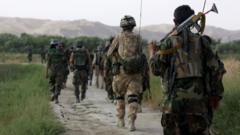In recent years, a brave cohort of older men in Ireland has stepped forward to recount the traumatic experiences of sexual abuse they suffered in Catholic-run schools during the latter half of the 20th century. This brave dialogue, blossoming over the past 24 months, has set the stage for a growing national conversation around the systemic issues embedded within religious educational institutions.
The accounts primarily consist of individuals now in their late 50s and 60s who are addressing the long-kept silence surrounding this sensitive topic. An official government inquiry initiated in September has already uncovered approximately 2,400 allegations of abuse across various religious schools, along with 884 alleged perpetrators, highlighting a deep-seated issue that has threaded through generations. Ireland's Minister for Education, Norma Foley, described the findings as "truly shocking," which has led to the initiation of a comprehensive investigation into these claims.
Despite the country’s ongoing struggle with the legacy of abuse tied to the Catholic church, the latest revelations offer a stark reminder of how many schools have further concealed serial offenders over decades. Survivors like John Coulter and Mark Vincent Healy stand at the forefront of accountability, their testimonies emphasizing the urgent need for recognition and redress.
The ripple effects of these revelations are significant, suggesting a potential shift in societal norms around masculinity, shame, and the willingness to confront uncomfortable truths. Tim Chapman, an academic engaged in restorative justice practices, emphasizes that the scale of survivor testimonies carries weight that might positively influence broader Irish societal movements towards healing and accountability.
This emerging testament from survivors not only calls for justice but also serves as a crucial moment of reflection on the cultural implications of abuse within these institutions, urging society to confront and dismantle the longstanding taboos surrounding such tragedies.





















